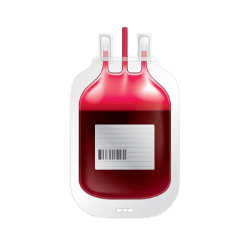
Challenges and Insights in Pakistan
Thalassemia is a genetic blood disorder that reduces the production of hemoglobin, leading to anemia and requiring patients with Thalassemia Major to undergo regular blood transfusions. In Pakistan, thalassemia is a significant public health issue, with an estimated 6,000 to 9,000 newborn babies diagnosed with the disease annually. This effort explores the challenges of blood transfusion frequency and associated costs.
Understanding Blood Transfusion for Thalassemia Patients
Blood transfusions are crucial for managing thalassemia, as they help to restore the hemoglobin levels in patients. The frequency of transfusions varies depending on the type of thalassemia:
- Beta Thalassemia (Major): Patients often require blood transfusions every 2 to 4 weeks to maintain adequate hemoglobin levels.
- Beta Thalassemia (Minor): These patients may not require regular transfusions and often lead normal lives, needing transfusions only during severe anemia or surgery.
- Alpha Thalassemia: The need for transfusions depends on the severity of the condition, with some patients needing regular transfusions while others do not.
Challenges and Hurdles
Despite the life-saving benefits of blood transfusions, thalassemia patients in Pakistan face numerous challenges:
1. Financial Burden
The cost of blood transfusions can be significant. Patients often face expenses related to:
- Transfusion Costs: Each transfusion can range from PKR 5,000 to 10,000, depending on the hospital.
- Screening Costs: Blood must be screened for infectious diseases, adding to the financial burden.
- Medical Care: Regular check-ups, iron chelation therapy, and treatment of complications can further increase costs.
Many families struggle to afford these expenses, leading to inadequate treatment and poor health outcomes.
Blood Transfusion Process and Hustles
The blood transfusion process involves several key steps to ensure patient safety:
- Blood Donation: Donors voluntarily donate blood, which is then screened for infectious diseases.
- Compatibility Testing: Before transfusion, blood type and compatibility are tested to avoid adverse reactions.
- Transfusion Procedure: The transfusion is administered through an intravenous (IV) line, and patients are monitored for any side effects.
- Post-Transfusion Monitoring: Patients are observed for a period to ensure there are no adverse reactions.
Conclusion
Blood transfusions are a critical component of thalassemia management, yet they come with challenges that need addressing. By increasing public awareness, improving blood donation drives, and providing financial support for patients, we can enhance the quality of life for those affected by thalassemia in Pakistan. Moreover, ensuring that every thalassemia patient receives timely and adequate care is essential for managing this condition effectively.
Hashtags
#Thalassemia #BloodTransfusion #ThalassemiaCare #HealthcareInPakistan #HealthAwareness #BloodDonation #Anemia #PublicHealth #ThalassemiaSupport #ThalassemiaManagement #PakistanHealth











Leave a Reply